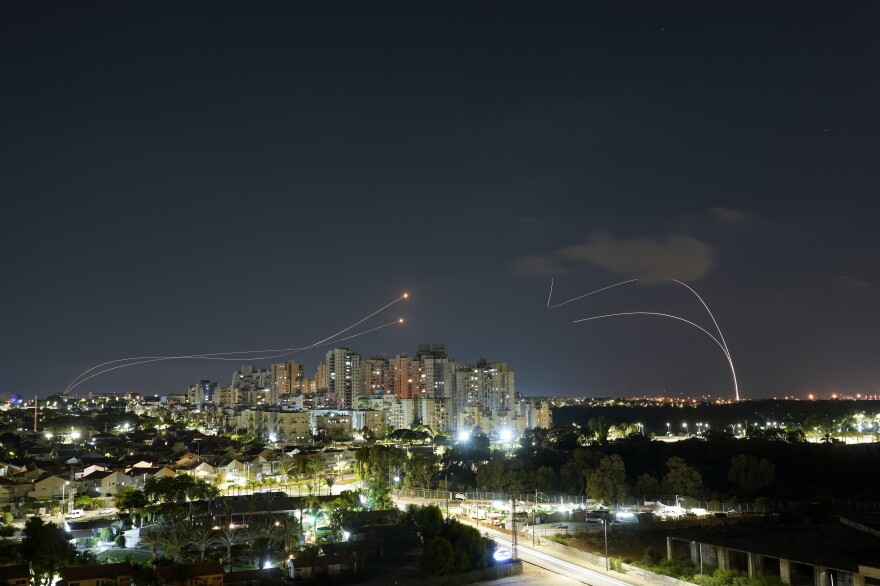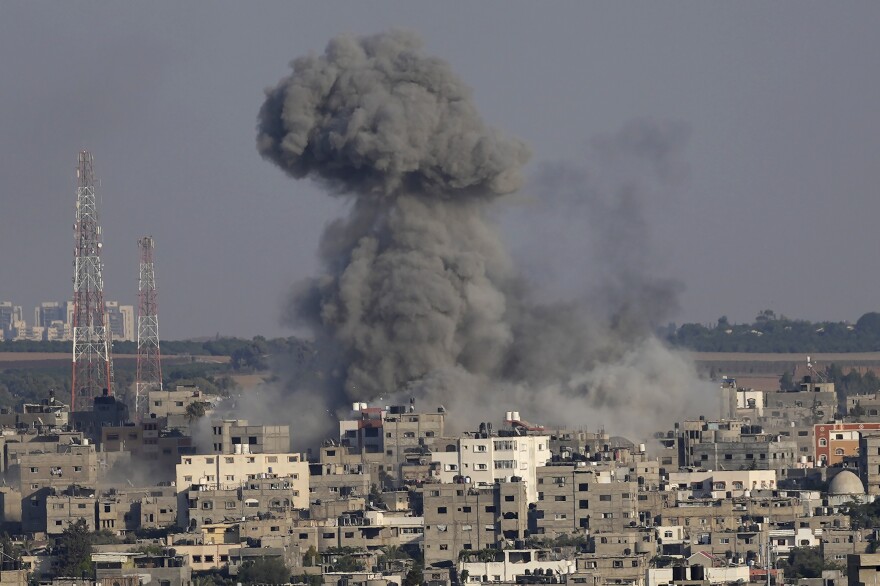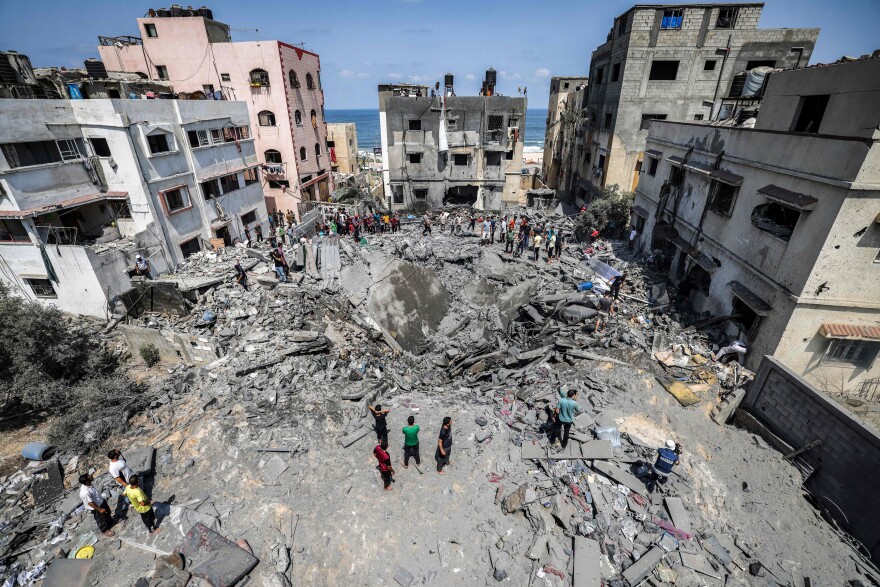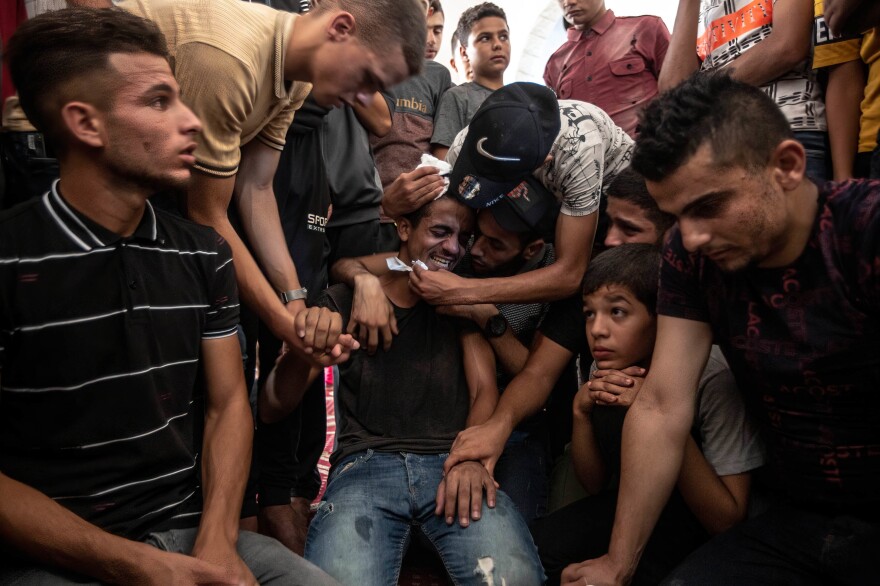GAZA CITY, Gaza Strip — When fighting erupted between Israel and the hard-line Palestinian militant group, Islamic Jihad, here earlier this month, the battle lasted just three days but it took a heavy toll: Gaza's Health Ministry said 49 Palestinians were killed, including 17 children.
The Israeli military said it was targeting Islamic Jihad members for allegedly planning or executing attacks on Israelis. Israel says it killed 20 militants and acknowledges killing several civilians. Islamic Jihad responded to the attacks by firing more than 1,100 rockets, according to Israel, which said some of the rockets killed Gazan civilians when the projectiles fell short and landed in Gaza.
People in Gaza say they believe the violence, and duration, would have been even worse had the larger, ruling militant group, Hamas, gotten involved. But in a change of tack, Hamas sat this one out.

Since the fighting — the deadliest in Gaza since last year's 11-day war — residents are having difficult discussions about the roles of the militant groups.
Most Gazans support resistance against Israel for its treatment of Palestinians, and the militants do have active supporters. But many residents are frustrated at the groups over problems like unemployment and deep poverty. And some analysts see a rift forming between Hamas and Islamic Jihad, even though they project unity.
People want a say when war erupts
"Where is the role of the people when these factions go to war?" asks Ahmed, a 37-year-old who wants to only use his first name to speak freely without fear of reprisals from militants. "The people should have a say ... because we end up paying the price."
Ahmed is sipping tea with friends in a park in Gaza City. The park and surrounding streets have gone totally dark — because the severe power shortage often leads to blackouts here.
Ahmed says he's in favor of Palestinian resistance, but he blames Islamic Jihad for escalating the latest conflict in order to make a deal with Israel and free some of its prisoners.

He was glad to see Hamas stay out of the fighting. "It's possible Hamas finally realized that war brings nothing but destruction," he says.
Hamas and Islamic Jihad: partners and rivals
Hamas took over Gaza from the Palestinian Authority about 15 years ago, leading Israel to impose heavy restrictions on goods and people transiting Gaza's borders. Hamas has fought multiple wars against Israel.
Both Hamas and Islamic Jihad are listed as terrorist organizations by the United States, the European Union, Israel and other governments. The groups share some common ideology; analysts say they both want to create an Islamic Palestinian state — something many in Gaza support. Neither group recognizes Israel's existence.
Their official line has been to present a unified front.
Yet some Gazans accuse Hamas of abandoning Islamic Jihad, even as Israel targeted the group's leaders this month. Israel called the operation a success that severely set back Islamic Jihad.

On Monday, Hamas and Islamic Jihad leaders met to discuss bilateral relations and released a joint statement affirming their unity, saying that "the resistance is the strategic choice in confronting the occupation."
However, the rivalry between the two has never been more obvious, according to Tholfekar Swairjo,a political analyst who previously was a spokesman for a secular leftist Palestinian movement and now offers commentary in local media.
"First of all, Hamas wants to protect its authority in the Gaza Strip," he says. "There is boiling anger in the streets against the Hamas movement. They are blamed for the very low quality of life in Gaza, and so now they don't want to engage in any war that would increase the level of anger against them from the Palestinians."
Swairjo says Hamas couldn't jeopardize recent understandings with Israel that would bring economic relief to Gaza. Thousands of Palestinians from Gaza are now allowed to work in Israel, and there has also been an increase in goods and supplies going into Gaza.
Islamic Jihad — considered more hard-line — views that as selling out.
"Islamic Jihad say economic incentives that Israel has offered to Gaza has become a knife to the neck of the armed resistance," Swairjo says.
The two militant groups are also in competition for supporters. And according to Swairjo, Hamas has lost some of its recruiting momentum to Islamic Jihad.
Unlike Hamas, which participates in elections and now governs, Swairjo says, Islamic Jihad has no political ideology or even goals beyond fighting Israel. And that can attract a lot of different groups, from Islamists to secular and leftist followers.
Gazans lose hope in their future
For many Gazans, however, there's no difference between Hamas and Islamic Jihad.

At a crowded seaside terrace, 32-year-old Reham is smoking a water pipe known as a hookah with friends. She gave NPR her first name only, to be able to speak frankly about politics without fear of militant groups.
"Most Gazans have stopped believing in Hamas and the others," she says. "You know why? Because they don't feed us, they don't provide anything. You have to depend on yourself. How can we build a future with these guys? And all the back to back wars?"
The presence of the militant groups is also threatening and divisive, she adds. The fighters are often targeted by the Israelis, and civilians who live near them can become casualties.
"People have started to be afraid of where they are living, who their neighbors are, what their political leanings might be," Reham says. "It's affecting community relationships."
She and many others think it's foolish to expect stability in Gaza.
"There is no guarantee for anything in Gaza," she says. "We don't know when or why or how the war happens."
All that's known is, when war happens, she says, no one is safe, regardless of politics.
Copyright 2022 NPR. To see more, visit https://www.npr.org.





